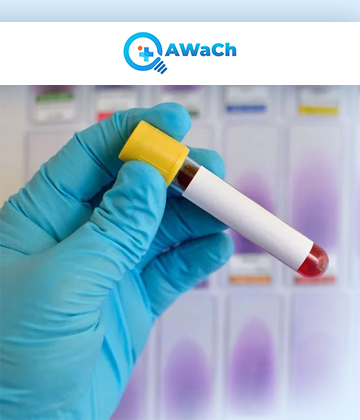In Vitro Ddiagnosis
(IVD) In Vitro Ddiagnosis refers to the process of performing diagnostic tests or examinations on samples of bodily fluids, tissues, or other specimens outside the human body, typically in a laboratory setting or at home or office (in case of self-tests).
These tests are crafted to identify and detect diseases, conditions, infections, or abnormalities within the body. In modern healthcare, In Vitro Ddiagnosis plays a pivotal role by providing healthcare professionals with vital insights into a patient's health status.It aids in preventing diseases, detecting them early, and formulating treatment strategies. Healthcare professionals frequently use these tests to screen, diagnose, and monitor a variety of medical conditions.
In Vitro Ddiagnosis Various types of in vitro diagnostic tests are accessible, including: LFA-based testing, Clinical Chemistry Tests, Microbiology Tests, Hematology Tests, Molecular Diagnostics, Histopathology Tests and other Point-of-Care Testing (POCT).
What is In Vitro Ddiagnosis ?
In this paragraph, In Vitro Ddiagnosis (IVD) tests undergo rigorous development, validation, and quality control processes to ensure accuracy, reliability, and reproducibility. They are regulated by government bodies, such as Central Drug Standard Control Organization (CDSCO) In India, government agencies like the U.S. Food and Drug Administration (FDA) in the United States or the European Medicines Agency (EMA) in the European Union regulate this to ensure patient safety and test effectiveness. Overall, in vitro diagnosis holds a critical role in managing diseases, empowering healthcare providers to make informed decisions about patient care, treatment choices, and the monitoring of therapeutic effectiveness.
In vitro diagnosis involves analyzing samples taken from the human body outside of the living organism to diagnose medical conditions or diseases. This approach involves conducting various laboratory tests on specimens such as blood, urine, tissue, or other bodily fluids, allowing healthcare professionals to identify the presence of specific markers, pathogens, or abnormalities that could indicate a particular health condition. Here are some key points about in vitro diagnosis.
In vitro diagnosis encompasses a diverse array of diagnostic tests, including blood tests, urine tests, molecular tests (such as PCR), immunoassays (like ELISA), and genetic tests, among others. These tests facilitate the detection of a range of diseases, including infections, cancers, metabolic disorders, and genetic conditions.

In Vitro Diagnosis (IVD) refers to the process of conducting diagnostic tests or examinations on samples of bodily fluids, tissues, or other specimens outside the human body, typically within a laboratory setting or in the convenience of one’s home or office for self-tests. These meticulously designed tests serve the crucial purpose of identifying and detecting diseases, medical conditions, infections, or abnormalities within the body. In contemporary healthcare, IVD plays an indispensable role by furnishing healthcare professionals with indispensable insights into a patient’s state of health. It contributes to disease prevention, early detection, and the formulation of effective treatment strategies. Healthcare practitioners frequently employ these tests for screening, diagnosing, and monitoring an array of medical conditions.
IVD encompasses a wide spectrum of diagnostic tests, including but not limited to Lateral Flow Assay (LFA)-based testing, Clinical Chemistry Tests, Microbiology Tests, Hematology Tests, Molecular Diagnostics, Histopathology Tests, and Point-of-Care Testing (POCT). These tests are rigorously developed, validated, and subjected to quality control processes to ensure their accuracy, reliability, and reproducibility.
Advantages:
In Vitro Diagnosis (IVD) offers numerous advantages in the realm of healthcare. Firstly, it empowers healthcare providers with the means to prevent, detect, and manage diseases effectively. Additionally, IVD tests play a pivotal role in disease prevention by enabling early diagnosis, which is often critical for successful treatment outcomes. Moreover, they provide healthcare professionals with essential information for making informed decisions about patient care, treatment choices, and the ongoing monitoring of therapeutic effectiveness. Furthermore, IVD tests are instrumental in screening for a broad spectrum of conditions, ranging from infections to cancers, metabolic disorders, and genetic conditions
Recognitions:
The field of In Vitro Diagnosis is subject to rigorous regulation and oversight by government bodies, such as the Central Drug Standard Control Organization (CDSCO) in India, the U.S. Food and Drug Administration (FDA) in the United States, or the European Medicines Agency (EMA) in the European Union. These regulatory agencies ensure the safety, efficacy, and performance of IVD tests to protect patient well-being. In vitro diagnosis holds a paramount position in the healthcare landscape, empowering healthcare providers to deliver high-quality care, make timely diagnoses, and enhance patient outcomes.
Innovation:
In Vitro Diagnosis continues to witness innovations and advancements in diagnostic technologies, methodologies, and test modalities. These innovations aim to improve the accuracy, efficiency, and accessibility of diagnostic testing. Emerging technologies, such as molecular diagnostics and genetic testing, are expanding the scope of IVD, allowing for more precise and personalized healthcare. As the field continues to evolve, it holds the potential to revolutionize disease management and enhance the quality of healthcare delivery.
